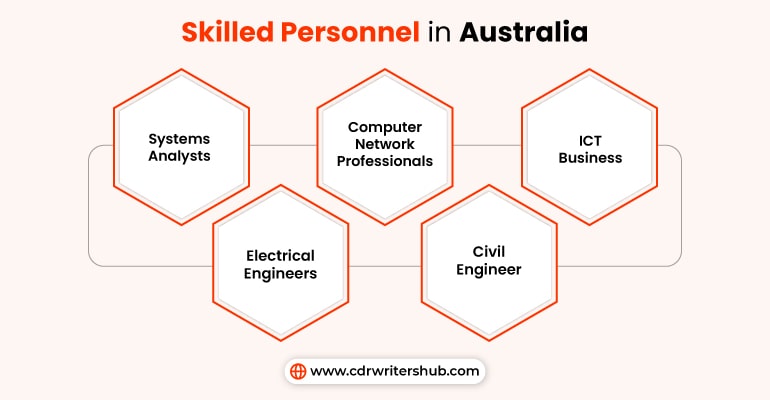Top in-demand skilled personnel in Australia

Top in-demand skilled personnel in Australia
Overseas applicants seeking employment and study opportunities have long been drawn to the country. A lot of it has to do with the way of life, the pay, and, of course, the beautiful weather. Australia has always had a clear and fair immigration policy and welcomes migrant workers, so if you’re considering a migration, you will need to meet the requirements as stated.
Every year, many migrant workers attempt to qualify for a working visa in Australia. The Australian Skilled Migration program is the best approach to finding a job and obtaining a work-based visa. This is true for occupations on Australia’s Skilled Occupations List (SOL), which is a job shortage list.
Skilled personnel in Australia
Table of Contents
Engineers and ICT professionals have long identified Australia as a land of opportunities. Such careers are in high demand, and there are a variety of possibilities available, giving you the flexibility to work where you are most needed. In 2022, engineers and ICT applicants will be more valuable than ever. The world is changing at a breakneck pace, and we require employees who can keep up.

The growing demand for engineers is affecting businesses across the board, and they must have qualified engineer applicants so that they can always be working on something new and innovative to stay ahead of the race. If you’re unsure about the field you should pursue while studying, you’ve come to the correct place. Here are some of the professions that are in demand in Australia, along with the average pay.
1. ICT Business Analysts
ICT Business Analysts in Australia work with users to formulate system requirements, develop system plans and documentation, review and evaluate existing systems, and design and modify systems to meet users’ business needs. ANZSCO Code 261111 ICT Business Analyst learning from the business group, you can solve the problem. The average business analyst’s compensation in Australia is $110,035 per year or $56.43 per hour. The starting salary for entry-level positions is $99,466 per year, with most experienced individuals earning up to $136,500 per year.
2. Systems Analyst
A Systems Analyst works with businesses to develop system requirements, develop plans and documents, review and evaluate existing systems, and design and modify those systems to meet the business needs of clients. The average system analyst income in Australia is $104,038 per year or $53.35 per hour. The starting salary for entry-level positions is $94,496 per year, with most experienced individuals earning up to $125,373 per year.
3. Computer Network Professionals
Computer Network and Systems Engineers plan, develop, deploy, test, and optimize network and system services, as well as provide troubleshooting and fault-finding services for network problems. They are also responsible for configuration management and overall operational readiness of network systems, particularly in environments with multiple operating systems and configurations. Computer Network and Systems Engineers work on the design, installation, repair, and maintenance of computers and other electronic devices. In Australia, the average compensation for a computer network engineer is $70,000 per year or $35.90 per hour. Entry-level jobs start at $60,000 per year, with the highest-paid individuals earning up to $82,700 per year.
4. Electrical Engineers
Electrical Engineer Designs are responsible for the design, production, installation, operation, and maintenance of equipment, machines, and systems used in the generation, distribution, utilization, and control of electric power. You may need to register or get a license. In Australia, the average compensation for electrical engineers is $127,500 per year or $65.38 per hour. Entry-level jobs start at $90,000 per year, with the highest-paid individuals earning up to $149,000 per year.
5. Civil Engineer
Civil engineers ANZSCO 233211 plan, design, and organize civil engineering projects such as dams, bridges, pipelines, gas and water supply schemes, sewage systems, airports, and other civil engineering projects, as well as supervise their construction and operation. You may need to register or get a license. The average civil engineer income in Australia is $157,500 per year or $80.77 per hour. Entry-level jobs start at $115,000 per year, with the highest-paid individuals earning up to $273,000 per year.
Relevant Skill Assessment
These are some of the burning job demands currently in trend for 2022. To secure your position at a reputed company, you’ll require relevant expertise as well as industry-recognized qualifications.
Engineers and ICT experts can go through various pathways of skill assessment. For engineers, Engineers Australia has provided 6 application pathways where they can get their skill assessment. If the applicant does not meet the Accord of Washington, Dublin, and Sydney, they will have to take the CDR pathway.
As for ICT professionals, ACS has 4 application pathways. Among all the application pathways, applicants who have tertiary qualifications with little or no ICT content or who do not have any recognized tertiary qualifications should use the RPL application process.
Why choose CDRWritersHub for the CDR report and RPL report?
If you need assistance preparing a CDR for Engineers Australia or an RPL for ACS, our professionals are available 24/7. Our experts are familiar with all the rules and guidelines. In addition to writing CVs, Career Episodes (CEs), Summary Statements (SS), Continuing Professional Development (CPD), and Employment reference letters for RPL, CDRWritersHub offers a range of other services. Whether you’re in the engineering field or the IT world, you can get free samples for any profession.


